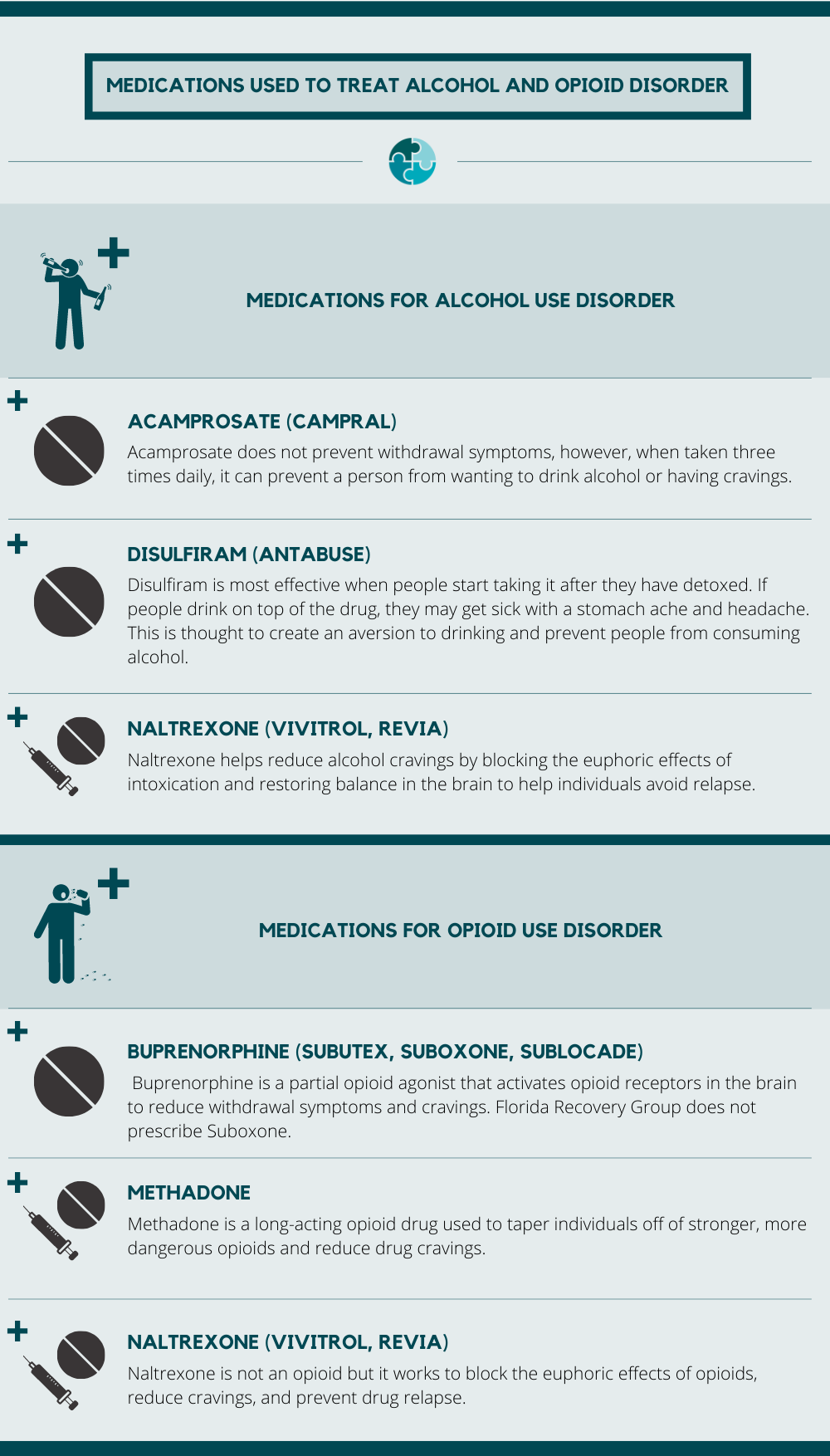
05 Aug What is Medication-Assisted Treatment (MAT) Like in Delray Beach?
Addiction is a complex disease that everyone experiences differently. No two individuals have the exact same treatment needs, so treatment plans may vary from one person to the next. Traditional treatment approaches involve behavioral therapy, counseling, and peer support. However, pressure from the increasing opioid crisis in combination with advancements in modern medicine has changed the go-to approach for addiction treatment.
Today, many drug and alcohol rehab centers in Delray Beach incorporate treatment medications that are specifically intended to treat opioid and alcohol addiction into the rehab process. Treatment that combines behavioral therapy and FDA-approved medications is called medication-assisted treatment (MAT).
What is Medication-Assisted Treatment (MAT)?
Addictions to alcohol and opioids are difficult to overcome. Some individuals can benefit from an approach that combines FDA-approved pharmaceuticals with traditional treatment methods. Medication-assisted treatment (MAT) is an evidence-based approach consisting of medication, behavioral therapy, and counseling to provide individuals with a comprehensive, whole-patient approach.[1]
While treatment medications work to reduce drug cravings, alleviate withdrawal symptoms, and restore balance in the brain, therapy and counseling teach individuals coping skills and resources they can use to stay sober. According to the Substance Abuse and Mental Health Services Administration (SAMHSA), MAT can:[1]
- Reduce the likelihood of individuals leaving treatment early
- Improve treatment outcomes
- Lower the risk of relapse after treatment
- Prevent illegal and risky behaviors associated with illicit drug use
- Reduce the risk of overdose
- Improve outcomes in babies born to mothers who are addicted to opioids during pregnancy

Medications for Alcohol Use Disorder
The FDA has approved three medications to treat alcohol use disorder.[2]
- Acamprosate (Campral) – Acamprosate does not prevent withdrawal symptoms, however, when taken three times daily, it can prevent a person from wanting to drink alcohol or having cravings.
- Disulfiram (Antabuse) – Disulfiram is most effective when people start taking it after they have detoxed. If people drink on top of the drug, they may get sick with a stomach ache and headache. This is thought to create an aversion to drinking and prevent people from consuming alcohol.[3]
- Naltrexone (Vivitrol, Revia) – Naltrexone helps reduce alcohol cravings by blocking the euphoric effects of intoxication and restoring balance in the brain to help individuals avoid relapse.
Medications for Opioid Use Disorder
The FDA has also approved three medications to treat opioid dependence.[2]
- Buprenorphine (Subutex, Suboxone, Sublocade) – Buprenorphine is a partial opioid agonist that activates opioid receptors in the brain to reduce withdrawal symptoms and cravings. Florida Recovery Group does not prescribe Suboxone.
- Methadone – Methadone is a long-acting opioid drug used to taper individuals off of stronger, more dangerous opioids and reduce drug cravings.
- Naltrexone (Vivitrol, Revia) – Naltrexone is not an opioid but it works to block the euphoric effects of opioids, reduce cravings, and prevent drug relapse.
These medications can only be administered by physicians who have undergone specialized training. All MAT medications are intended to be used in combination with a comprehensive treatment program that addresses the underlying causes of addiction.[4]
How Does Medication-Assisted Treatment (MAT) Work in Delray Beach?
Many addiction treatment centers in Delray Beach offer medication-assisted treatment (MAT) because it is a highly effective approach. MAT programs consist of detox, rehab, and medication management.
Detox
The first step of any treatment program is detox. While not all of the above-listed medications can be used during detox, alternative medications can be administered to alleviate withdrawal symptoms and prevent complications. Patients in detox have around-the-clock supervision, medical services, and monitoring to keep them safe and comfortable throughout the process.
Medication Management
Patients participating in medication-assisted treatment (MAT) in Delray Beach have regular appointments with their doctors. They will receive medications, discuss side effects and/or concerns, and be monitored for compliance. When patients are ready to stop taking a medication or switch medications, they work closely with their doctor to develop a tapering schedule. These appointments will continue as long as a person is enrolled in MAT.[4]
Inpatient/PHP/IOP/OP
Medications used in MAT are only effective when combined with an individualized treatment program that offers behavioral therapy or counseling. Patients can receive MAT by attending any level of care—inpatient, PHP, IOP, or outpatient. During rehab in Delray Beach, patients can expect the following:
- Behavioral therapies
- Group counseling
- Individual counseling
- Family therapy
- Relapse prevention
- Life skills training
- Discharge planning
Medications that reduce cravings and withdrawal symptoms can make individuals more clear-headed, allowing them to put their full energy and focus into their treatment regimen.
Find Out if Medication-Assisted Treatment (MAT) in Delray Beach is Right For You
Medication-assisted treatment (MAT) isn’t right for everyone. You should never start taking a prescription medication without a doctor’s supervision. Even if MAT isn’t right for you, our team at Florida Recovery Group will help you find a program that works.
If you or a loved one are struggling with drug or alcohol addiction, we’re here to help. Call now to get started with addiction treatment in Delray Beach.
References:
- https://www.samhsa.gov/medication-assisted-treatment
- https://www.samhsa.gov/medication-assisted-treatment/medications-counseling-related-conditions
- https://www.ncbi.nlm.nih.gov/pmc/articles/PMC3919718/
- https://www.fda.gov/drugs/information-drug-class/information-about-medication-assisted-treatment-mat





